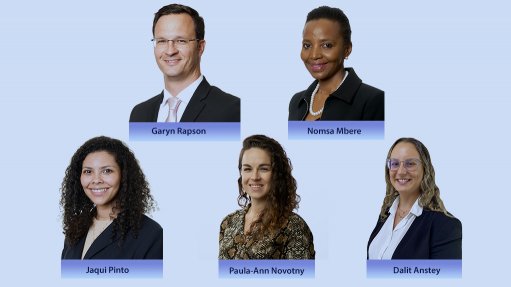
Webber Wentzel highlights funding opportunity for mining companies that are doing the right thing.
Photo by: Creamer Media
JOHANNESBURG (miningweekly.com) – Mining companies that can demonstrate responsible and sustainable mining practices can set themselves up to take advantage of the current environmental, social and governance (ESG) and sustainable finance trends, says law firm Webber Wentzel.
“In 2023, ESG will continue to gain regulatory traction across sectors, including the mining sector. Understanding key ESG themes and ESG risks is an important step to enable mining companies to seize ESG opportunities.
“The prominence of ESG presents an opportunity for mining companies to be proactive rather than reactive and to engage with ESG themes and issues,” say Webber Wentzel partners Garyn Rapson and Nomsa Mbere, senior associates Jaqui Pinto and Paula-Ann Novotny, and knowledge lawyer Dalit Anstey, who identify green and clean and Fourth Industrial Revolution (4IR) themes that are presenting mining companies with new business opportunities.
Identified as one theme is the just energy transition – a framework that seeks to ensure equitable shifts to a green economy/society through social inclusion and poverty eradication.
The just energy transition is described by the law firm as something that aims to protect the environment as well as livelihoods, to ensure that no-one is left behind. South Africa's Just Transition Framework document provides that between 2040 and 2050, coal will largely be phased out and communities will engage in other livelihoods, it points out.
This must be understood, the law firm adds in a release to Mining Weekly, amid Paris Agreement obligations, which have resulted in the South African government enacting legislation and regulations restricting fossil fuel consumption along with direct and indirect exposure to fossil fuels.
With South Africa having to rely on its coal to fuel baseload power and the economy, there are several energy-transition pressure points for mining companies, including funding pressures from some financial institutions and lenders, and shareholder activism regarding fossil fuel finance. Stock exchanges across the world are increasing their disclosure obligations to include ESG factors.
Portfolios are being diversified to include future-facing minerals and opportunities in green hydrogen, hydrogen fuel cell mobility and battery electric vehicles. Exploration activities and acquisitions are likely to see growth. Partnerships with companies both inside and outside the mining sector will be important.
OPERATIONAL DECARBONISATION
Many of the largest metals and mining companies have set some level of net-zero greenhouse gas emissions target. Drivers of this move to net zero include the Paris Agreement, Intergovernmental Panel on Climate Change, shareholder and stakeholder expectations, and financial institutions and stock exchanges. Investors’ capital allocation decisions are being increasingly driven by the view that climate change is a material financial risk.
With the focus on decarbonisation, many mining companies are repurposing. There is a risk that 'carbon-washing' re-branding is underpinned only by their current limited action on climate impacts and narrow net-zero focus. We are seeing an increase in the number of claims being brought for alleged 'greenwashing', which essentially means making misleading statements regarding one's green credentials or claiming one is greener than one is.
Recent amendments to electricity legislation are paving the way for greater private sector involvement in South Africa’s electricity industry. So far, there has been uptake by mines to establish renewable energy facilities at their sites to power the mines and ancillary operations, reducing the mine's respective carbon footprint. There are also opportunities for mines to potentially feed excess power generated back to the grid. Mines are also undertaking resilience-type projects, including energy efficiency projects in waste recycling and water treatment, Webber Wentzel observes.
FOURTH INDUSTRIAL REVOLUTION
The 4IR is resulting in the ongoing transformation of traditional industries such as mining with smart technologies. Automation, digitalisation, analytics, and artificial intelligence are changing the way that mines operate.
Automation and mechanisation in the mining sector could have positive net effects for the adverse environmental impacts of mining operations, such as technologies that eliminate the need for physical prospecting or exploration activities.
Technology could also assist in areas such as mine health and safety and reducing accidents and fatalities, the law firm adds, citing the example of mining recording a step-change in reducing fatalities in 2022 partly as a result of using more technology and systems to reduce deaths from falls of ground. In 2023, it will be using advanced technology to reduce fatalities from trackless mobile machinery.
However, there is also a risk that increased reliance on automation and mechanisation could undermine the just energy transition if workers' jobs in the mining industry are replaced by technology and deemed redundant.
“Workers will need to be reskilled, redeployed and redirected to higher-value, technology-driven jobs, which requires proper planning and funding, careful strategic thinking and planning, and engaging with all necessary stakeholders to ensure that the transition in South Africa is 'just' for the specific context,” the law firm adds.